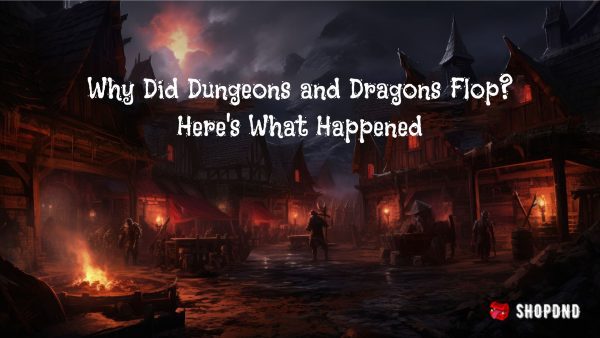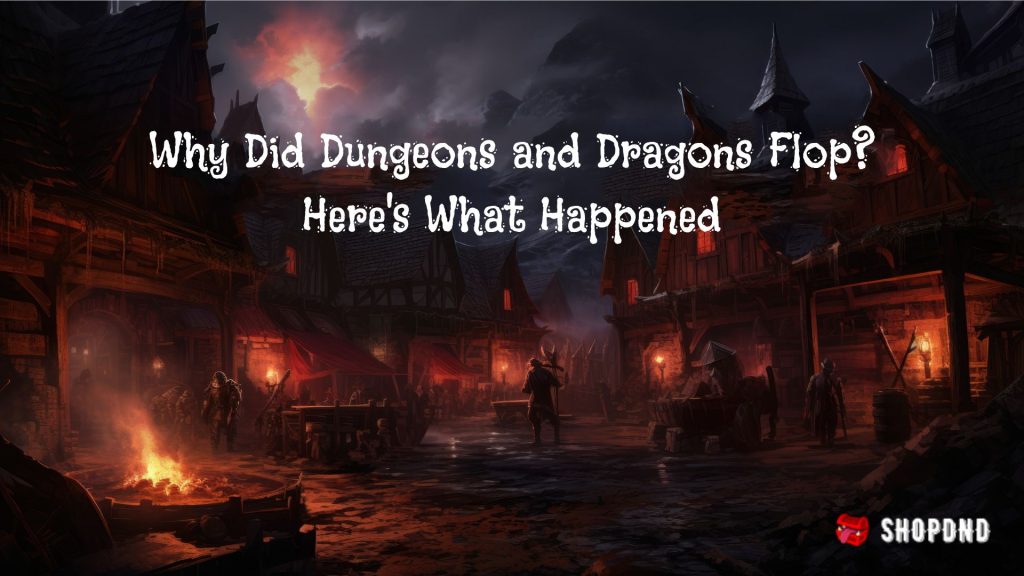
Why Did Dungeons and Dragons Flop? Here's What Happened
Dungeons & Dragons (DnD), the iconic tabletop role-playing game (RPG), has long been a cornerstone of geek culture. It's inspired countless imaginations, with its captivating stories, legendary campaigns, and detailed worlds. But despite its success in certain periods, there was a time when the game flopped. If you're wondering, why did Dungeons and Dragons flop? Let's take a deep dive into the ups and downs of this fascinating journey.
The Beginning of Dungeons & Dragons: A Cultural Phenomenon
When Dungeons & Dragons was first released in 1974 by Gary Gygax and Dave Arneson, it ignited a cultural revolution in the world of gaming. The game became a pioneer of tabletop RPGs, offering players a chance to embody different characters and embark on adventures limited only by imagination. The beauty of DnD was in the creative freedom it gave its players, allowing for deep, immersive storytelling. Soon, the game spread through schools, dormitories, and basements across America, capturing the hearts of adventurers everywhere.
In the early 1980s, DnD reached new heights, achieving a level of popularity that few other games had seen before. It was more than just a game; it was a cultural movement. But as quickly as it grew, it was also met with pushback from critics and moral panic in the media.
The Fallout: Why Did Dungeons and Dragons Flop?
So, why did Dungeons and Dragons flop in some parts of the world? The answer lies in a combination of societal reactions, market challenges, and unfortunate timing.
The Moral Panic and Media Backlash
In the early 1980s, Dungeons & Dragons became embroiled in controversy. Critics of the game claimed that it promoted occultism and violence. The media sensationalized stories about players losing touch with reality and getting caught up in the “dark side” of the game. One infamous case involved a teenager, James Dallas Egbert III, who disappeared in 1979, and the media quickly linked his disappearance to his involvement with Dungeons & Dragons. Despite no evidence connecting DnD to the incident, the game was associated with risky, dangerous behavior, leading to widespread moral panic.
This backlash played a significant role in why Dungeons and Dragons flopped during that period. As a result, its popularity began to decline, and parents grew wary, while some stores even refused to sell the game.
The Dungeons & Dragons Movie: A Major Setback
While the 1980s and 1990s saw a decline in tabletop play, things took another turn for the worse in the year 2000. The highly anticipated Dungeons and Dragons movie was released, but it failed to capture the hearts of fans and critics alike. The film’s weak plot, underdeveloped characters, and lackluster special effects led to its failure at the box office.
Critics and fans alike criticized the movie for not doing justice to the beloved world of Dungeons & Dragons. Many felt that the filmmakers had missed the mark in capturing the essence of the game. In a world filled with fantastic fantasy epics like Lord of the Rings, the DnD movie simply couldn’t measure up, further tarnishing the brand's reputation.
So, did the Dungeons and Dragons movie contribute to the game's decline? Absolutely. It became one of the key factors in why Dungeons & Dragons flopped for a time.
Competition from Other RPGs
During the late 1990s and early 2000s, the gaming landscape began to shift. The rise of online gaming, particularly MMORPGs (Massively Multiplayer Online Role-Playing Games) like World of Warcraft, created stiff competition for Dungeons & Dragons. Unlike DnD, which required players to gather around a table to roll dice and interact face-to-face, these digital RPGs allowed players to immerse themselves in virtual worlds from the comfort of their own homes. This shift led many to wonder: why did Dungeons and Dragons flop in the face of this digital wave?
The internet revolutionized the gaming experience, providing a more accessible and expansive environment for players. Dungeons & Dragons struggled to keep up with the allure of digital RPGs, contributing to its decline during this period.
The Dungeons & Dragons Revival: A New Chapter
Despite its temporary setbacks, Dungeons & Dragons never truly disappeared. In fact, the game has seen a resurgence in recent years. The release of the 5th Edition in 2014, which streamlined gameplay and improved accessibility, brought in a new generation of players. The game’s rules were simplified, making it easier for newcomers to jump into the action, while retaining the depth and creativity that longtime players loved.
This revival coincided with a larger cultural shift towards geek culture, as fantasy TV shows, movies, and books surged in popularity. Game of Thrones, Stranger Things, and other pop culture phenomena sparked a renewed interest in role-playing games like DnD.
The Role of Podcasts and Live-Streamed Campaigns
One of the biggest contributors to the DnD renaissance has been the rise of podcasts and live-streamed campaigns. Shows like Critical Role have played a crucial role in introducing the game to millions of people worldwide. The show’s success has demonstrated the power of Dungeons & Dragons as an entertainment medium, captivating both gamers and non-gamers alike. Fans could listen to live campaigns while engaging with the characters and world-building, making the experience more interactive than ever before.
This resurgence has also been fueled by social media, where fans share their own DnD stories, memes, and homebrew content. These online communities have become a powerful force in driving the game’s renewed popularity.
Will There Be Another Dungeons and Dragons Movie?
As Dungeons & Dragons continues to gain popularity, fans are wondering: Will there be another Dungeons and Dragons movie? The answer is yes! In 2023, a new Dungeons & Dragons movie, Dungeons & Dragons: Honor Among Thieves, was released to critical acclaim. Unlike its 2000 predecessor, this film successfully captured the spirit of the game with a comedic, action-packed adventure and solid performances from its cast. The movie’s success marks a new era for DnD on the big screen, and it’s likely that more adaptations will follow. Given the resurgence of interest in the franchise and the movie's positive reception, it’s safe to say that DnD will continue to inspire cinematic adventures well into the future.
Want to know if the movie truly lives up to the hype? Check out our detailed review from a DnD enthusiast’s perspective!
The Future of Dungeons & Dragons
Dungeons & Dragons has proven to be more than just a game. It’s a cultural institution that continues to evolve. From its humble beginnings in the 1970s to its peak in the 80s, its decline in the 90s and 2000s, and its triumphant return in recent years, DnD has managed to endure through thick and thin. The game’s resurgence is a testament to its enduring legacy and ability to adapt to the changing tastes of gamers.
As we look to the future, the question remains: Will Dungeons & Dragons continue to thrive, or is another decline on the horizon? Given its ability to evolve with the times and its current resurgence in popularity, it seems that Dungeons & Dragons is here to stay.
Conclusion: Dungeons & Dragons' Enduring Legacy
So, why did Dungeons and Dragons flop for a period of time? It was a combination of external pressures, including media backlash, a failed movie, and the rise of digital competitors. But despite these setbacks, the game has persevered and regained its rightful place in popular culture. Whether you’re a seasoned dungeon master or a curious newbie, Dungeons & Dragons offers endless adventure and creativity.
Ready to embrace your inner adventurer? Explore Shop DnD’s exclusive clothing collections and wear your love for DnD with pride. Explore our collection here


